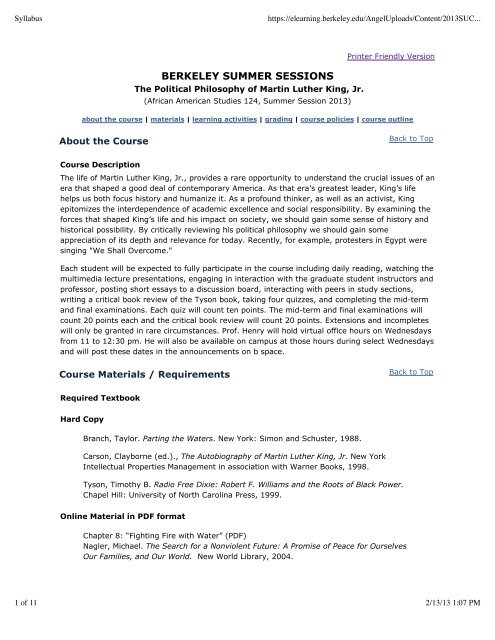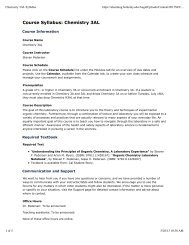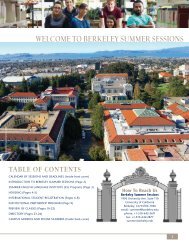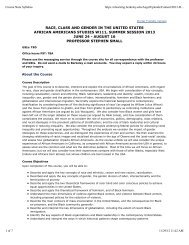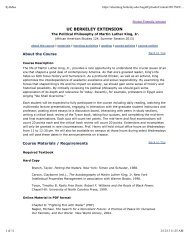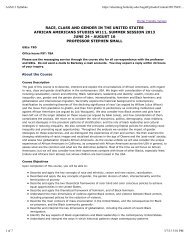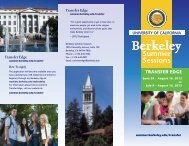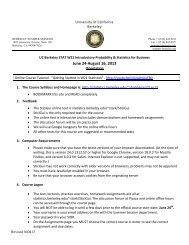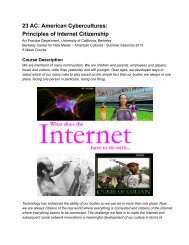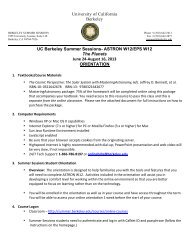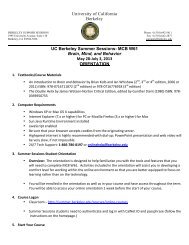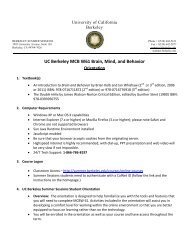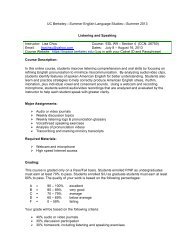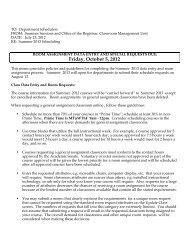BERKELEY SUMMER SESSIONS
BERKELEY SUMMER SESSIONS
BERKELEY SUMMER SESSIONS
You also want an ePaper? Increase the reach of your titles
YUMPU automatically turns print PDFs into web optimized ePapers that Google loves.
Syllabushttps://elearning.berkeley.edu/AngelUploads/Content/2013SUC...<strong>BERKELEY</strong> <strong>SUMMER</strong> <strong>SESSIONS</strong>The Political Philosophy of Martin Luther King, Jr.(African American Studies 124, Summer Session 2013)Printer Friendly Versionabout the course | materials | learning activities | grading | course policies | course outlineAbout the CourseBack to TopCourse DescriptionThe life of Martin Luther King, Jr., provides a rare opportunity to understand the crucial issues of anera that shaped a good deal of contemporary America. As that era’s greatest leader, King’s lifehelps us both focus history and humanize it. As a profound thinker, as well as an activist, Kingepitomizes the interdependence of academic excellence and social responsibility. By examining theforces that shaped King’s life and his impact on society, we should gain some sense of history andhistorical possibility. By critically reviewing his political philosophy we should gain someappreciation of its depth and relevance for today. Recently, for example, protesters in Egypt weresinging "We Shall Overcome."Each student will be expected to fully participate in the course including daily reading, watching themultimedia lecture presentations, engaging in interaction with the graduate student instructors andprofessor, posting short essays to a discussion board, interacting with peers in study sections,writing a critical book review of the Tyson book, taking four quizzes, and completing the mid-termand final examinations. Each quiz will count ten points. The mid-term and final examinations willcount 20 points each and the critical book review will count 20 points. Extensions and incompleteswill only be granted in rare circumstances. Prof. Henry will hold virtual office hours on Wednesdaysfrom 11 to 12:30 pm. He will also be available on campus at those hours during select Wednesdaysand will post these dates in the announcements on b space.Course Materials / RequirementsBack to TopRequired TextbookHard CopyBranch, Taylor. Parting the Waters. New York: Simon and Schuster, 1988.Carson, Clayborne (ed.)., The Autobiography of Martin Luther King, Jr. New YorkIntellectual Properties Management in association with Warner Books, 1998.Tyson, Timothy B. Radio Free Dixie: Robert F. Williams and the Roots of Black Power.Chapel Hill: University of North Carolina Press, 1999.Online Material in PDF formatChapter 8: “Fighting Fire with Water” (PDF)Nagler, Michael. The Search for a Nonviolent Future: A Promise of Peace for OurselvesOur Families, and Our World. New World Library, 2004.1 of 11 2/13/13 1:07 PM
Syllabushttps://elearning.berkeley.edu/AngelUploads/Content/2013SUC...PowerPoint lecture, there is also a “PDF handout.” This supplement is available for printing andnote taking.DiscussionsThe purpose of the online discussion board is to create a group knowledge base. Please share yourexperiences, thoughts, outside references, and any insights you have gained from our assignedreadings. Comments should provide insight and encourage meaningful discussion. Comments suchas "I agree" are not appropriate unless accompanied by statements that qualify the commentthrough personal experience or references. Post a response that uses proper sentence structure,spelling and grammar; points will be deducted for misspelling and improper grammar.Acknowledge and show respect for the diversity of opinions presented by your classmates.Post your response to each discussion question as a reply to the topic message. This way theMessage Board will be properly threaded and easy to read. If you mispost a message, simply copythe content of the message, then delete the message and repost it.Discussions are expected to be posted by the due date each week. If they are late, 5 points will bededucted from the final grade.Drop BoxSubmit your written assignments by attaching the document to its specified drop box. If attachinga Word-processed file, save it in rich text format (.rtf) or as a text file (.txt) before attaching. Keepcopies of all your work.Book ReviewThe Book Review will act as a measure of how well you can articulate your understanding of thematerial presented. It should be approximately 1500 to 2000 words in length. Adhere to thefollowing guidelines to receive full credit for the review:1.2.3.4.5.6.7.8.Follow directions.Share thoughts, experiences, and insight on the chosen topic.You may need to use other resources besides the required texts to present your views.If applicable, display decision-making and problem-solving skills.Write in complete sentences, using proper punctuation, grammar, and spelling rules.Submit using the Drop Box in Angel by the due date.Submit documents in Microsoft Word.Cite all references using the APA format.Additional Guidelines can be found in Module Eight.Submitting AssignmentsIt is important to start the course soon and begin submitting work regularly. Your assignments willbe submitted through the Drop Box or Discussion Boards.Virtual Office Hours - ChatsThe Course Instructor/Facilitator will set virtual office hours when students can communicate realtime (synchronously). While these chats are optional they can be valuable for case studydiscussion, answering questions, or reviewing for quizzes. Students can log into their CourseFaculty/Facilitator’s chat room by clicking on Chat >Join (next to Course Faculty/Facilitator’sname). Faculty/Facilitator chats are optional; no points are awarded for participation. Days and3 of 11 2/13/13 1:07 PM
Syllabushttps://elearning.berkeley.edu/AngelUploads/Content/2013SUC...3. Why did the Albany movement fail?Reading: Carson, Chapters 16-19D. Theme: The March on WashingtonQuestions:1. Why did John Lewis have to change his speech?2. Why has King’s address become iconic?Reading: Branch, Chapter 22; Carson, Chapter 20Week IV. Legislating ChangeMid-term Examination – July 10thA. Theme: A New Political WillQuestions:1. Why is the 1964 Civil Rights bill more effective than earlier bills?2. How did Kennedy’s assassination effect the movement?Reading: Carson, Chapters 21 & 22B. Theme: Reward and PunishmentQuestions:1. How did the Nobel Prize affect King?2. Why did the FBI want to silence King?Reading: Carson, Chapter 24; Garrow, Chapter 1C. Theme: The Mississippi ChallengeFilm: "Freedom Summer"Questions:1. How did the involvement of Whites change SNCC?2. How did the MFDP influence today’s Democratic Party?Reading: Carson, Chapter 23Week V. Selma and Voting RightsA. Theme: DemocracyQuestions:1. Why weren’t previous voting laws effective?2. Did Malcolm go to Selma to challenge King?Reading: Carson, Chapter 258 of 11 2/13/13 1:07 PM
Syllabushttps://elearning.berkeley.edu/AngelUploads/Content/2013SUC...1. What is the legacy of picking up the gun?2. What unites King with Malcolm and Williams?Reading: Tyson, all Book Review due - August 12thBook Review due – Auguest 6thC. Theme: Black Leadership TodayQuestions:1. What happened to SCLC?2. What are the similarities and differences between Jackson & King &Obama?D. Final Examination – Friday, August 16th, time and location TBA.© 2013 UC Regents. All rights reserved.11 of 11 2/13/13 1:07 PM


